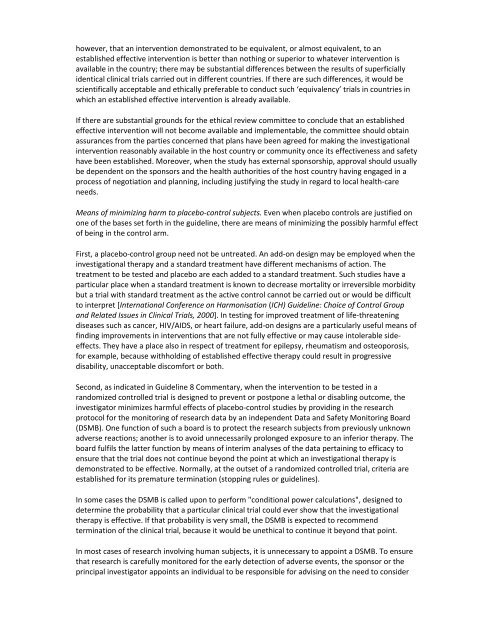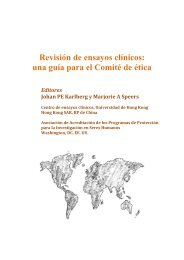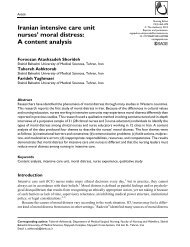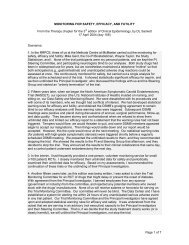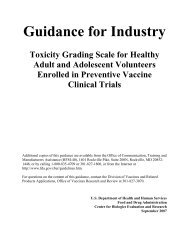CIOMS Guidelines - Global Health Trials
CIOMS Guidelines - Global Health Trials
CIOMS Guidelines - Global Health Trials
- No tags were found...
You also want an ePaper? Increase the reach of your titles
YUMPU automatically turns print PDFs into web optimized ePapers that Google loves.
however, that an intervention demonstrated to be equivalent, or almost equivalent, to anestablished effective intervention is better than nothing or superior to whatever intervention isavailable in the country; there may be substantial differences between the results of superficiallyidentical clinical trials carried out in different countries. If there are such differences, it would bescientifically acceptable and ethically preferable to conduct such ‘equivalency’ trials in countries inwhich an established effective intervention is already available.If there are substantial grounds for the ethical review committee to conclude that an establishedeffective intervention will not become available and implementable, the committee should obtainassurances from the parties concerned that plans have been agreed for making the investigationalintervention reasonably available in the host country or community once its effectiveness and safetyhave been established. Moreover, when the study has external sponsorship, approval should usuallybe dependent on the sponsors and the health authorities of the host country having engaged in aprocess of negotiation and planning, including justifying the study in regard to local health-careneeds.Means of minimizing harm to placebo-control subjects. Even when placebo controls are justified onone of the bases set forth in the guideline, there are means of minimizing the possibly harmful effectof being in the control arm.First, a placebo-control group need not be untreated. An add-on design may be employed when theinvestigational therapy and a standard treatment have different mechanisms of action. Thetreatment to be tested and placebo are each added to a standard treatment. Such studies have aparticular place when a standard treatment is known to decrease mortality or irreversible morbiditybut a trial with standard treatment as the active control cannot be carried out or would be difficultto interpret [International Conference on Harmonisation (ICH) Guideline: Choice of Control Groupand Related Issues in Clinical <strong>Trials</strong>, 2000]. In testing for improved treatment of life-threateningdiseases such as cancer, HIV/AIDS, or heart failure, add-on designs are a particularly useful means offinding improvements in interventions that are not fully effective or may cause intolerable sideeffects.They have a place also in respect of treatment for epilepsy, rheumatism and osteoporosis,for example, because withholding of established effective therapy could result in progressivedisability, unacceptable discomfort or both.Second, as indicated in Guideline 8 Commentary, when the intervention to be tested in arandomized controlled trial is designed to prevent or postpone a lethal or disabling outcome, theinvestigator minimizes harmful effects of placebo-control studies by providing in the researchprotocol for the monitoring of research data by an independent Data and Safety Monitoring Board(DSMB). One function of such a board is to protect the research subjects from previously unknownadverse reactions; another is to avoid unnecessarily prolonged exposure to an inferior therapy. Theboard fulfils the latter function by means of interim analyses of the data pertaining to efficacy toensure that the trial does not continue beyond the point at which an investigational therapy isdemonstrated to be effective. Normally, at the outset of a randomized controlled trial, criteria areestablished for its premature termination (stopping rules or guidelines).In some cases the DSMB is called upon to perform "conditional power calculations", designed todetermine the probability that a particular clinical trial could ever show that the investigationaltherapy is effective. If that probability is very small, the DSMB is expected to recommendtermination of the clinical trial, because it would be unethical to continue it beyond that point.In most cases of research involving human subjects, it is unnecessary to appoint a DSMB. To ensurethat research is carefully monitored for the early detection of adverse events, the sponsor or theprincipal investigator appoints an individual to be responsible for advising on the need to consider


